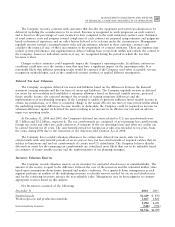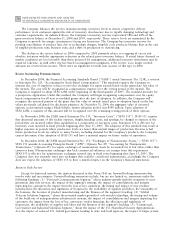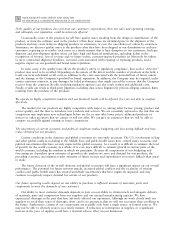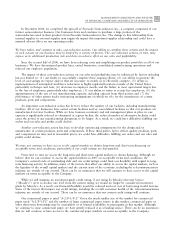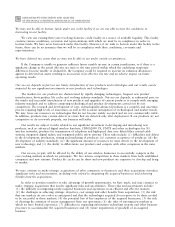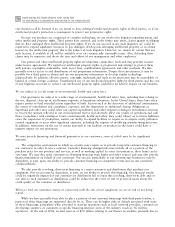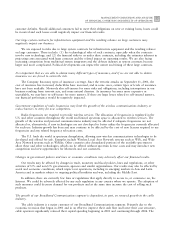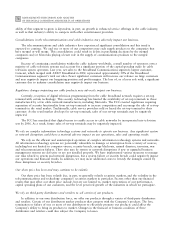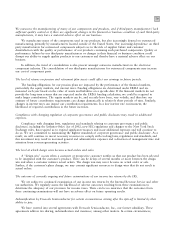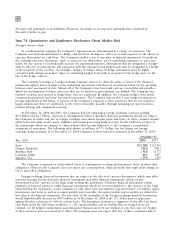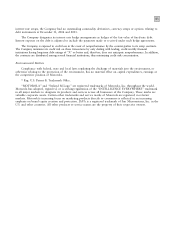Motorola 2004 Annual Report Download - page 83
Download and view the complete annual report
Please find page 83 of the 2004 Motorola annual report below. You can navigate through the pages in the report by either clicking on the pages listed below, or by using the keyword search tool below to find specific information within the annual report.
75
MANAGEMENT'S DISCUSSION AND ANALYSIS
OF FINANCIAL CONDITION AND RESULTS OF OPERATIONS
Many acquisition candidates in the industries in which we participate carry higher relative valuations than we
do. This is particularly evident in software and services businesses. Acquiring a business that has a higher valuation
than Motorola is dilutive to our earnings, especially when the acquired business has little or no revenue. In
addition, we may not pursue opportunities that are highly dilutive to earnings and have, in the past, foregone such
acquisitions.
Key employees of acquired businesses may receive substantial value in connection with a transaction in the
form of change-in-control agreements, acceleration of stock options and the lifting of restrictions on other equity-
based compensation rights. To retain such employees and integrate the acquired business, we may oÅer additional,
sometimes costly, retention incentives.
Our success is dependent, in part, upon our ability to form successful strategic alliances. If these arrangements do
not develop as expected, our business may be adversely impacted.
We currently partner with industry leaders to meet customer product and service requirements and to develop
innovative advances in design and technology. Our partnerships allow us to supplement internal manufacturing
capacity and share the cost of developing next-generation technologies. If such arrangements do not develop as
expected, for example, because the technologies provided by our partners are not protected or infringe on third
parties' intellectual property rights, or the technology or other contributions by our partners do not meet quality or
safety standards, our business could be adversely impacted.
As a supplier to the automotive industry, we face certain risks due to the nature of the automotive business.
As a supplier of powertrain chassis and telematics communication products, our sales of these products and
our proÑtability could be negatively impacted by changes in the operations, products, business models, part-sourcing
requirements, Ñnancial condition, market share or consumer Ñnancing and rebate programs of our automotive
customers. In addition, demand for our automotive products is linked to consumer demand for automobiles, which
may be adversely impacted by the continuing uncertain economic environment.
The value of our investments in the securities of various companies Öuctuates and it may be diÇcult for us to
realize the value of these investments.
We hold a portfolio of investments in various companies. Since the majority of these securities represent
investments in technology companies, the fair market values of these securities are subject to signiÑcant price
volatility. In addition, the realizable value of these securities is subject to market and other conditions.
We also have invested in numerous privately-held companies, many of which can still be considered in startup
or developmental stages. These investments are inherently risky as the market for the technologies or products they
have under development are typically in the early stages and may never materialize. We could lose all or
substantially all of our investments in these companies, and in some cases have.
It may be diÇcult for us to recruit and retain the types of highly-skilled employees that are necessary to remain
competitive.
Competition for key technical personnel in high-technology industries is intense. We believe that our future
success depends in large part on our continued ability to hire, assimilate and retain qualiÑed engineers and other
highly-skilled personnel needed to compete and develop successful new products. We may not be as successful as
our competitors at recruiting, assimilating and retaining these highly-skilled personnel, especially because of our
recent employee reductions.
The unfavorable outcome of litigation pending against or future litigation could materially impact the Company.
Our Ñnancial results could be materially adversely impacted by unfavorable outcomes to any pending or future
litigation, including without limitation any relating to the Iridium project or Telsim. See ""Item 3ÌLegal
Proceedings.'' There can be no assurances as to the favorable outcome of any litigation.






